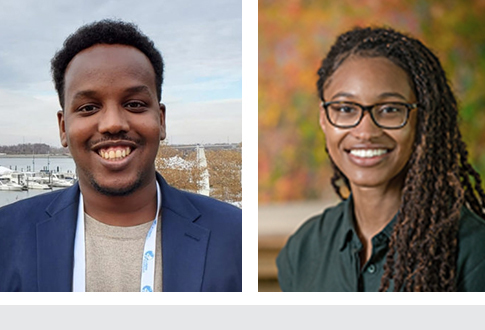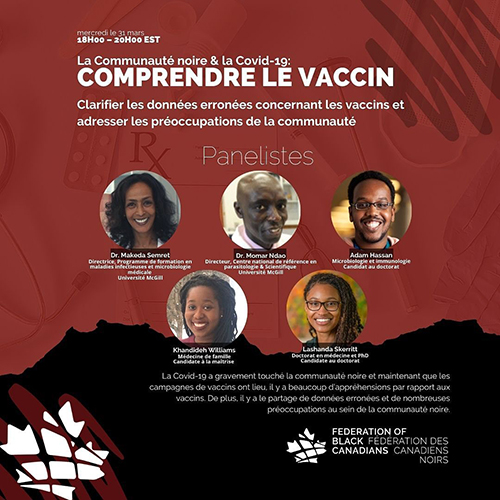
Fil d'Ariane
- Nouvelles et événements
- Nouvelles
- Content
- Des stagiaires de recherche comblent le fossé existant entre le milieu scientifique et le grand public
null Des stagiaires de recherche comblent le fossé existant entre le milieu scientifique et le grand public
Deux stagiaires de recherche de l’IR-CUSM parlent de leur expérience de panélistes lors d’un webinaire visant à sensibiliser la population
Lashanda Skerritt et Adam Hassan

Source : IR-CUSM. La pandémie de COVID-19 a fait ressortir l’existence de lacunes dans le domaine de la communication scientifique et a miné la confiance envers les symboles d’autorité dans le discours public. L’hésitation à l’égard de la vaccination continue à mettre en évidence les défis liés au renforcement de la confiance dans les mesures de santé publique, plus particulièrement dans les communautés qui ont été marginalisées par nos systèmes de santé et par nos institutions. En effet, de tout temps, on a passé sous silence ou négligé les besoins et les préoccupations de plusieurs communautés au Canada, y compris les communautés noires. S’attaquer au problème de l’hésitation ou de la réticence face à la vaccination requiert des approches qui reconnaissent les préoccupations de ces communautés, qu’on n’a pas écoutées, et qui mettent l’accent sur ces préoccupations.
En mars 2021, avec une autre étudiante de l’Université McGill, Khandideh Williams, nous avons été invités à nous joindre à Momar Ndao, D.M.V., Ph. D. et à Makeda Semret, M.D., M. Sc., tous deux membres de l’Institut de recherche du Centre universitaire de santé McGill (IR-CUSM), à titre de panélistes lors d’un webinaire visant à sensibiliser la population, intitulé « Black Health and COVID-19 » (La santé des Noirs et la COVID-19). Organisé par la Fédération des Canadiens noirs, l’événement visait à s’attaquer à la désinformation et à dissiper les préoccupations de la communauté noire. L’un des objectifs de cette activité était aussi de répondre aux questions des membres de cette communauté, au sein de laquelle le pourcentage d’hésitation à l’égard du vaccin est plus élevé que dans la population générale canadienne. Des participants issus de plusieurs provinces ont posé de judicieuses questions sur le développement des vaccins contre la COVID-19, sur les risques des effets secondaires des vaccins et sur les risques liés à la forme grave de la COVID-19.
Pour contrer la désinformation et la peur qui empêchent certaines personnes et certaines communautés d’avoir accès aux ressources en matière de santé, il faut d’abord instaurer un climat de confiance et rencontrer les gens où ils sont.
Nous avons puisé dans les résultats de nos recherches et dans nos connaissances pour répondre aux questions portant sur l’action des vaccins. Nous avons de plus expliqué pourquoi nous pouvons avoir confiance en leur sécurité; enfin, nous avons aussi parlé de l’importance de la vaccination, tant pour la santé individuelle que pour la santé communautaire. Nous avons surtout appris qu’il s’avère essentiel de créer un espace sécuritaire, où les participants peuvent poser leurs questions et faire part de leurs préoccupations, et d’être réceptifs à de nouvelles données.
L’obligation vaccinale et même diverses mesures d’incitation à se faire vacciner peuvent devenir inutiles si l’on ne se préoccupe pas du problème de la méfiance. Pour contrer la désinformation et à la peur qui empêchent certaines personnes et certaines communautés d’avoir accès aux ressources en matière de santé, il faut d’abord instaurer un climat de confiance et rencontrer les gens où ils sont. En tant que stagiaires de recherche dans le domaine des sciences de la santé, nous nous trouvons dans une position favorable pour utiliser nos connaissances et nos compétences pour soutenir les communautés, en misant sur la communication scientifique et sur le renforcement de la confiance. Nous espérons que les cinq leçons que nous avons tirées de notre expérience vont aider nos collègues stagiaires qui envisagent la possibilité de sensibiliser la population à certains enjeux, alors qu’ils commencent une nouvelle année universitaire riche en nouveaux engagements.
- Sortir de la bulle universitaire. Il est important de reconnaître que, comme stagiaires, bien que nous soyons en train d’approfondir nos connaissances et de développer notre savoir-faire et notre expérience, nous avons un savoir étendu qu’il vaut la peine de transmettre aux communautés non universitaires. Nous pouvons également aider à communiquer des résultats d’études scientifiques dans une langue plus facile à comprendre pour les publics non universitaires. Ces échanges à vocation éducationnelle sont bidirectionnels, car nous pouvons aussi développer une meilleure compréhension des questions posées par les communautés ou qui ont eu une incidence sur nos recherches.
- Connaître ses limites. Il est également essentiel de reconnaître les limites de notre savoir-faire et de notre expérience. Il est possible que nous n’ayons pas les réponses à toutes les questions qui nous sont posées. Reconnaître nos limites est un élément important de la communication. Nous pouvons utiliser les outils et les réseaux à notre disposition pour chercher les réponses ailleurs ou pour demander l’avis de personnes ayant plus de connaissances et d’expérience que nous.
- Créer un climat de confiance. Nous appartenons tous à des communautés de stagiaires de recherche et à des communautés universitaires, mais nous sommes également membres de collectivités ne faisant pas partie du milieu universitaire. Travailler avec les communautés avec lesquelles nous avons des liens ou avec lesquelles nous entretenons des relations depuis longtemps peut aider à faciliter la communication scientifique. En tant que membres de la communauté noire, une identité commune nous a aidés à gagner la confiance de l’auditoire et à améliorer la compréhension des points de vue des participants.
- Nouer le dialogue avec son public. Il est facile de présumer que les autres vont nous écouter, puisque nous venons d’un milieu valorisant le savoir-faire et la connaissance. Toutefois, il est essentiel de nouer le dialogue avec son public et de respecter ce dernier, en l’écoutant avant de donner des conseils ou de l’informer sur le sujet à aborder. Il faut créer un espace pour les participants, afin qu’ils puissent exprimer leurs préoccupations, et les écouter réellement. Lorsqu’on a le privilège d’être invité à prendre la parole lors d’un événement communautaire, ce type d’activité offre une tribune de choix pour l’échange de connaissances, car les participants y sont souvent réceptifs. Ils sont aussi disposés à écouter ce qu’on leur dit et plus perméables aux idées de la personne qui prend la parole devant eux.
- Diversifier les points de vue. Lorsque l’on parle de ses connaissances et que l’on fait partager son expérience avec un auditoire non spécialisé, il vaut la peine d’offrir divers points de vue et de présenter des expériences diversifiées. Pour ce qui est de la table ronde à laquelle nous avons participé en mars 2021, les membres du public ont été exposés à des points de vue venant d’intervenants du milieu de la recherche scientifique, de la pratique médicale et de la santé publique.
Engagez-vous et prenez plaisir à participer à un échange enrichissant lors du prochain événement auquel on vous invitera!

Lashanda Skerritt est inscrite au programme double M.D.C.M.-Ph. D., à l’Université McGill et elle est stagiaire à l’IR-CUSM, au Programme en maladies infectieuses et immunité en santé mondiale (MIISM). Ses recherches se concentrent sur la prestation de soins de santé à l’intention des femmes vivant avec le VIH au Canada.
Adam Hassan est candidat au doctorat et stagiaire à l’IR-CUSM, au programme de MIISM. Ses recherches portent essentiellement sur le développement de nouveaux vaccins pour les maladies parasitaires, comme la schistosomiase, aussi appelée bilharziose.
—16 septembre 2021
Nouvelles connexes
Des chercheurs de l’IR-CUSM aident à surmonter la réticence vaccinale chez les adultes et les enfants